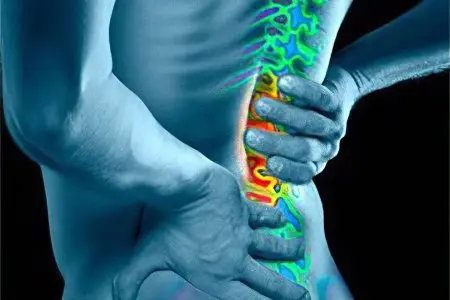Contents
The narrowing of the interdiscal space leads to compression of the nerve endings extending from the spinal cord. The pressure exerted by cartilage, tendons, bone and muscle tissue results in a pinched nerve in the back.
This phenomenon, accompanied by severe pain, is mainly experienced by older people. Heavy physical labor, excess weight – all these factors increase the risk of pinching.
Symptoms of a pinched nerve in the back

The main symptoms of a pinched nerve in the back include:
Sharp pain. Often, discomfort in the dorsal spine becomes the main and only sign of a pinched nerve in this area. Depending on the localization of pain, various types of the disease are distinguished. Unpleasant sensations when a nerve is pinched are noticeable not only in the back. They often radiate to the limbs or cervical region. Attacks of pain vary in strength and duration. They can last for several minutes or several hours. Even if the discomfort passes after a while without the use of drugs, attention should be paid to it. After all, neglected pinching of the nerve of the back leads to various complications that negatively affect the work of other tissues and organs in the body.
Numbness. It is felt in the area of localization of pain. In some cases, it is accompanied by tingling and loss of sensation.
Violation of the blood circulation of the brain. This symptom manifests itself in the form of dizziness, sudden changes in blood pressure. In acute attacks of pinching, hearing and vision impairments are possible, also caused by problems with the blood supply to the brain.
Muscle spasms. For this reason, patients complain of general weakness of the limbs. For a long time being at rest, for example, after sleep, they have difficulty performing the most simple movements. The morning spasm of the muscles of the back and limbs gradually disappears after the patients walk, do exercises.
Problems in the work of internal organs. A pinched autonomic or motor nerve in the back provokes more serious disorders. They manifest themselves in the form of deviations in the work of internal organs and their systems. This situation is dangerous because pain is not felt immediately, so pinching can only be determined during an examination by a specialist.
Causes of a pinched nerve in the back
The main causes of a pinched nerve in the back include:
Muscle strain. A pinched nerve can be the result of increased stress, including heavy lifting. For this reason, pain in the lumbar region is often a concern for hard workers and athletes.
Back injury. Displacement or subluxation of a vertebra as a violation of their natural position leads to pinched nerve.
Osteochondrosis. This disease and its consequences in the form of a herniated disc occurs after microtraumas that appear as a result of excessive physical exertion, during falls, jumps, and running. The gap between the intervertebral discs is significantly reduced, and the nerves located between them are compressed. It is the sciatic nerve that often suffers for this reason.
Protrusion. It is the result of a prolapsed intervertebral disc into the spinal canal. The integrity of the fibrous ring is not violated. Protrusion is one of the stages of osteochondrosis, followed by a hernia, which can also cause pinching. As a result of all these processes, the nerves are squeezed between the discs.
Types of pinched nerve in the back

Depending on the area of uXNUMXbuXNUMXbdistribution and the nature of the pain, the following types of it are distinguished when the nerve of the back is pinched:
Lumbalgia. Back discomfort defined by this term is also known as lumbago. It is characterized by sharp throbbing pains in the lumbar region. A pinched nerve is usually caused by osteochondrosis or intervertebral hernia. The development of such diseases leads to a reduction in the distance between the vertebrae. This causes inflammation of the nerves. Unpleasant sensations are felt with lumbago stronger during movements: turns from side to side, tilts in the lower back. The muscles of the back are tense during an attack of pain. The general mobility of the patient is limited.
Ischialgia. In contrast to acute pain backache, with lumbago, sciatica manifests itself in the form of dull aching pain. It is located in the region of the sciatic nerve. It is one of the largest in the human body and has many branches. It is with pinching of the sciatic nerve that sciatica is associated. This syndrome can be caused by many reasons, including injuries, tumors and various diseases of the spine. Ischialgia is manifested not only by pain, but also by numbness, tingling, which can lead to dysfunction of the pelvic organs.
Diagnosis and treatment of a pinched nerve in the back
The diagnosis is determined by the doctor on the basis of the patient’s complaints after a series of examinations: palpation, X-ray, magnetic resonance imaging. It is important to identify the cause of a pinched nerve in the back. Eliminating it, you can get rid of the pain.
First of all, treatment is carried out with non-steroidal anti-inflammatory drugs. They relieve pain. Conservative therapy involves the use of warming ointments and gels, compresses recommended by the doctor.
[Video] Doctor’s Clinic Length – Causes of pain under the shoulder blade. 5 tips on how to get rid of pain under the shoulder blade?:









